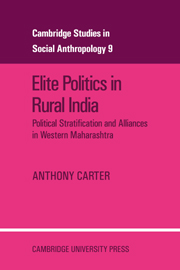 Elite Politics in Rural India
Elite Politics in Rural India Book contents
- Frontmatter
- Contents
- List of illustrations
- Acknowledgement
- Part I Introduction
- Part 2 Aspects of political stratification
- 3 Political arenas and the political class
- 4 Caste status and distribution
- 5 Land, labour, credit, and share capital
- 6 Descent groups and affinal networks
- Part 3 Political alliances
- Map of main Girvi settlement area
- Appendix
- Notes
- References
- Index
6 - Descent groups and affinal networks
from Part 2 - Aspects of political stratification
Published online by Cambridge University Press: 02 March 2010
- Frontmatter
- Contents
- List of illustrations
- Acknowledgement
- Part I Introduction
- Part 2 Aspects of political stratification
- 3 Political arenas and the political class
- 4 Caste status and distribution
- 5 Land, labour, credit, and share capital
- 6 Descent groups and affinal networks
- Part 3 Political alliances
- Map of main Girvi settlement area
- Appendix
- Notes
- References
- Index
Summary
It remains to demonstrate in what manner ties of kinship enter into political stratification. v∂t∂ndar Marathas, the predominant element of the political class of rural Western Maharashtra, are linked to the non-v∂t∂ndar Marathas, the largest section of the population falling outside the political class, by common Maratha caste identity. In principle, therefore, there is no reason why the two sections of the Maratha caste cannot be related also by ties of kinship and marriage which might either permit v∂t∂ndar to call upon their non-v∂t∂ndar relatives for support or permit the latter to make claims upon the former for patronage. In fact, however, ties of kinship and marriage link v∂t∂ndar and non-v∂t∂ndar Marathas infrequently and in only a few characteristic forms. Furthermore, v∂t∂ndar may be distinguished from the rest of the Maratha caste by their large corporate descent groups and far flung affinal networks and both of these features of v∂t∂ndar Maratha kinship are a support for their dominant position as well as a product of it. An analysis of political stratification and alliances, therefore, must take into account the networks of kinship ties which are available to elite politicians and also the ways in which such networks are linked to but different from those found among other sections of the population.
Relatives in the most inclusive sense are called natl∂g or natevaik in Marathi. Natevaik are of two kinds, bhauki and soyre. These two categories are mutually exclusive and exhaust the universe of relatives. According to informants bhauki are blood (r∂kt∂) relatives, while soyre are relatives by marriage (l∂gna).
- Type
- Chapter
- Information
- Elite Politics in Rural IndiaPolitical Stratification and Political Alliances in Western Maharashtra, pp. 77 - 98Publisher: Cambridge University PressPrint publication year: 1974


